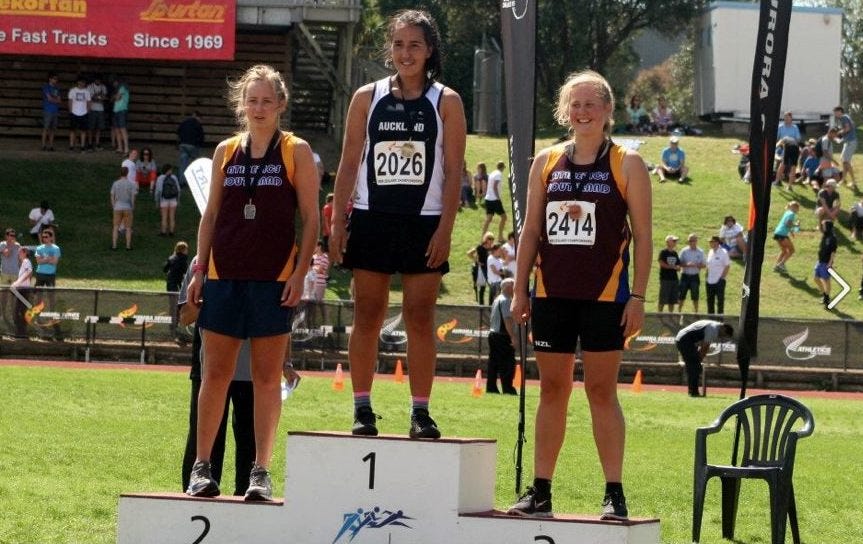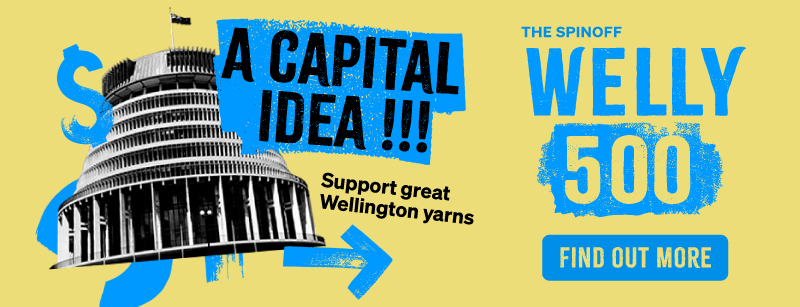If you really trained, could you be an Olympian?
Reporting in hostile environments, side hustles and old regrets
Mōrena and welcome to The Weekend, where dreams and regrets have time and space to flower. What’s the thing in your life that you wish you had given more energy to? It could be a relationship, an exam, a job or a dream abandoned. For me, it was the definitive decision to stop pursuing athletics in favour of writing. The moment I stopped trying to get better at throwing the javelin was the moment I began pondering whether or not javelin was in fact my true path and I’d made a huge mistake.
So a few weeks ago, I finally sat down and spoke to Tori Peeters, 2024 Olympian and someone I used to compete against. She’s a star, who you should absolutely watch out for in July, and I wanted to see “what could’ve been”. Athlete profiles are relatively common, but every time I read them I feel like they struggle to fully capture the sheer strangeness of athletes’ lives, and the very specific set of characteristics required to succeed as a professional sportsperson. And one thing that is often ignored is the fact that the vast majority of Olympic athletes dedicate their lives to their sport with no financial incentive. These are not multi-millionaire athletes who earn big bucks and set themselves up for life with their bodies. Instead, they’re people so committed to an action that they’ll dedicate time, money, everything to it with no promise of reward.
That’s what I wanted to figure out with Peeters. Why was she able to do that and not me? And was my assumption that Olympians are simply those willing to suffer, all wrong?
Why I’m not going to the Olympics
“Earlier in her career, arguably before her career had truly begun, Peeters settled for silver on the national stage only twice: once in 2013 and again in 2017, to the same thrower, who was the same age and stage as her, with the exact same ambitions.
That thrower was me.
In 2024 at the cafe inside the Cambridge velodrome, where high-performance athletes of all stripes spend their days training, I am no longer that thrower. When Peeters sits down across from me and my laptop, she looks like a stronger, leaner, faster version of the person I used to compete against. I sit up a little straighter, suddenly aware of how much I look like a weaker, softer, slower version of the person she used to compete against.”
Behind the Story
Wellington editor Joel MacManus appreciates that those we might not agree with can still make for an interesting and worthy story. Last weekend, he attended an anti-trans conference to hear speakers like Brian Tamaki, Posie Parker and NZ First MP Tanya Unkovich speak about the “dangers” of gender ideology. Joel’s feature was a chance to report on a culture war, rather than react to it, and prompted an intense response from the speakers themselve. He joined me on Behind the Story to talk about reporting in hostile environments and how to deal with feedback when it becomes abusive and personal.
Join The Spinoff Welly 500
Last August, The Spinoff hired Joel MacManus as its first-ever Wellington editor. His agenda-setting editorial project on the future of housing in the city, the War for Wellington, was funded entirely by existing Spinoff members and supported by many new donors. To sustain and grow our work in Wellington, we now need to ask Wellingtonians for help. The Spinoff is looking for 500 people to donate $50 or more and join a new community of supporters, The Spinoff Welly 500.
If we allow private jets, climate change is what we get
The private jet passengers saunter down the red carpet, wearing sunglasses and heels; paparazzi cameras flash. The sky is blue, the air control tower in the background is watchful and the climate protesters on each side of the red carpet are holding banners and chanting, “If we allow private jets, climate change is what we get.”
The sunglass-wearing “passengers” haven’t disembarked from a plane: they’re part of 350 Aotearoa, a climate action group staging a demonstration against private jets. Private jet use in New Zealand seems to be growing.
Just open a mine (plus five other brilliant ideas for getting by in a cost of living crisis)
The term side hustle has been around for about 70 years. The idea of doing something on the side to make more money to grow your personal wealth or because your actual job doesn’t pay enough has become a boon for content creators online. Many advocate getting involved in digital marketing schemes that magically create passive income streams. They all look too good to be true and are very complicated. As Kristin Kelly writes, if you are looking for a side hustle because “like all times, it’s a bad time to be poor”, you don’t need to look very far or develop elaborate schemes; you just need to follow the government’s lead. Try opening a mine, becoming a lobbyist or opening a charter school.
The stories Spinoff readers spent the most time with this week
One of the ways we gauge how readers feel about our work is by keeping an eye on how long people spend reading a story. People have spent longer reading Joel’s story (above) than anything else we’ve published this year.
“Munted” always works well in a headline, but in the context of Asia Martusia King’s story on the health of our fish stocks, it’s not great.
Is a return to LOTR the best or worst thing for Wellington? I (Gollum) argue with myself (Smeagol) about it.
As Alex Casey mentioned last week on Behind the Story, after working on a big story, it’s nice to be able to dive into some reality TV coverage. She caught up with a Married at First Sight NZ groom who only just finalised his divorce.
High school teacher Alastair Crawford finds the silver lining to the Ministry of Education job cuts.
More recommended reads for your weekend
Max Rashbrooke is now writing a fortnightly column for us. This week he looked at tax and the power of language to shape reality.
Claire Mabey tries to work out why book festivals are thriving while the publishing industry is struggling
Joel MacManus attends the opening night of a new musical comedy act by Jemaine Clement and Jonny Brugh and draws a very honest conclusion.
Gabi Lardies explains that if you want to actually help people in Gaza, don’t just block celebs, do BDS.
Introducing a new weekly interview series, where we ask a different local artist to curate their dream weekend soundtrack and load it for your weekend listening pleasure. First up: Troy Kingi.
Reader feedback of the week
Some bad memories of fake bacon on Hera Lindsay Bird's fake bacon ranking
Very heartening to see these kinds of comments on Alex Casey’s story last week about Adam and the landmark human rights case he’s bringing against Corrections.
Thanks for reading and see you next week,
— Madeleine Chapman

















